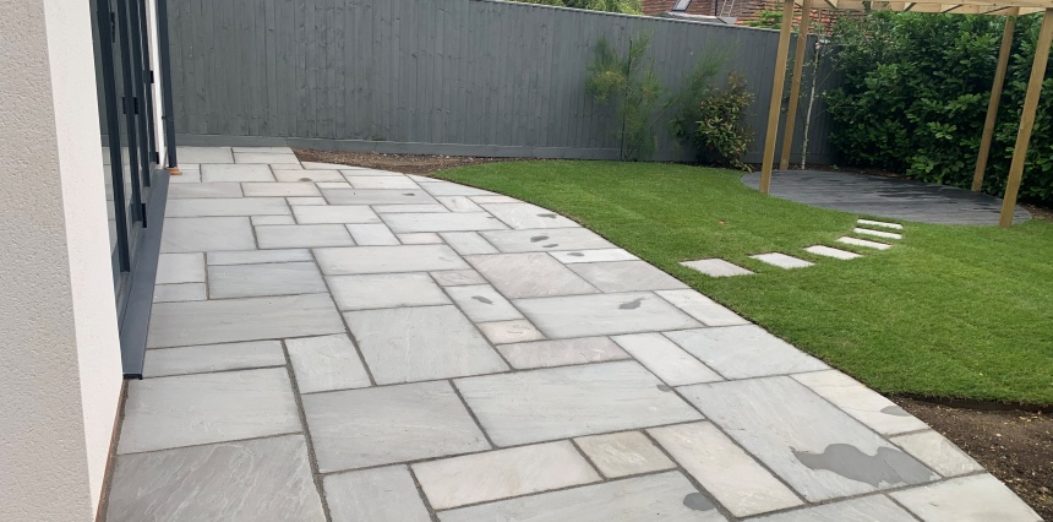How to look after your new patio

All patios need a bit of tender loving care now and again, whatever the material used. Whether your patio is constructed of stone paving, bricks, blocks, concrete or something completely different, it makes economic and social sense to do a bit of maintenance now and again!
Keeping your patio clean and tidy will not only prevent a build-up of moss and algae (which can make the patio very slippery), you’ll also find you’re much more inclined to use it on a regular basis when it looks good!
So after our recent post on designing a new patio and the addition of our patio gallery, here are a few tips for making sure your patio stays in tip top condition.
The Basics
The good news is that simply hosing the patio down with water, and sweeping regularly with a stiff brush, is often all that is required.
If you keep on top of this, and don’t let the condition of your patio deteriorate, you make life much simpler for yourself!
Jet/Pressure Washing
Jet or pressure washing the patio is a good way to spruce up the patio, normally in the spring after a cold, soggy winter. Think of it as a spring clean for the patio, getting it ready for the long, sunny summer ahead.
HOWEVER…
- Be careful with concrete paving, as excess or overly strong jet washing can damage the paving slabs. In extreme cases, the aggregate will be exposed.
- With older paving (hopefully not laid by us!), jet washing is likely to expose any failing pointing, so some repointing may be necessary.
- With block paving, jet washing will wash out a lot of the kiln dried sand in the joints, so re-sanding will be required. In any event, the joints of block paved patios will need some re-sanding regularly to prevent the blocks themselves being eroded by rain, snow, frost etc.
Stains & Chemicals
Proprietary patio cleaners can be used, but should be applied with care and infrequently, as they can affect the durability of the paving. Some may be toxic. Check the label carefully.
Similarly, herbicides can be used, especially to kill weeds growing in block paving joints, but these can also be toxic and may stain the paving or blocks. Try applying to a small, unobtrusive area of the patio first to check.
Some stains, from alcohol, barbecue fat, or chewing gum for example, may need special cleaning. In extreme cases, you may need to ask a specialist cleaning company to assist.
Sealants
One of the most effective ways to maintain your new patio is to use a sealant. This is best done soon after the patio has been laid.
Sealants fall into two categories: coatings and impregnators. Coatings form a film on top of the paving; impregnators actually penetrate the stone. In general, impregnators are longer lasting.
Many of the commonly available sealants impart a “wet look” to the paving (which customers tend to love or hate), although there are products which retain the natural colour of the stone. In addition, it is also possible to use a colour enhancer to accentuate the colour of the paving and deepen the tone. The benefit of using a colour enhancer (rather than a wet look sealant) is that it can be applied one coat at a time until the desired colour tone is achieved, and then a “natural colour” sealant can be applied to protect the paving. With a wet look sealant, it is “all or nothing”.
When considering whether to use a sealant on your new patio, the following pros and cons should be borne in mind:
Pros:
- Sealants help to preserve the colour of paving, and can enhance it
- They prevent weathering, and therefore prolong the life of the paving
- They make cleaning of stains and dirt much easier (often just a sweep will do the job)
- Some sealants are specifically formulated for certain materials (e.g. slate), and / or to protect against specific hazards (e.g. oil)
- Many are available in matt or gloss / wet look or natural
- It is also possible to use joint stabilising sealants which harden and prolong paving joint life.
Cons:
- Many of the commonly available brands (especially those which are coatings as opposed to impregnators) need re-applying every year or two
- The sealants which are guaranteed to last longer can be expensive, especially if the patio is very large
- Applying a sealant does not mean that the patio won’t need cleaning! It will just make it easier to do so. Dirt particles will be less onerous to sweep off.
Nice to know
ALDA Landscapes co-owner, John Hill is a qualified and approved installer for Dry Treat, who supply a wide range of very high quality specialist sealant products.
So, if you need advice or assistance, please do get in touch. Call us on 0118 934 2958.
thank you for your advice
You’re welcome Carol, glad we could help.
hi
please can you recommend a good color enhancer also a good sealer which will impregnate the slate slabs which make up my patio !!
many thanks
paul
Hi Paul,
Thanks for your comment. The only sealants ALDA Landscapes recommend are from the Dry-Treat range, please see the website at http://www.drytreat.com. We are an accredited applicator for their products.
Kind regards,
John
Hi i recently got a patio a few months ago but still haven’t sealed it. Weather has been poor. The concrete slabs are fading. What would you recommend?
Hi Joan,
We would recommend using Ole-Repella sealer for your concrete paving. It is a penetrating, invisible and breathable water-based sealer which protects porous surfaces against stains to keep surfaces looking great. Unfortunatley concrete paving will fade over time and yes it has been a wet summer but obviously choose a dry day to apply the sealer, hopefully September will prove to be a better month for doing jobs around the garden!